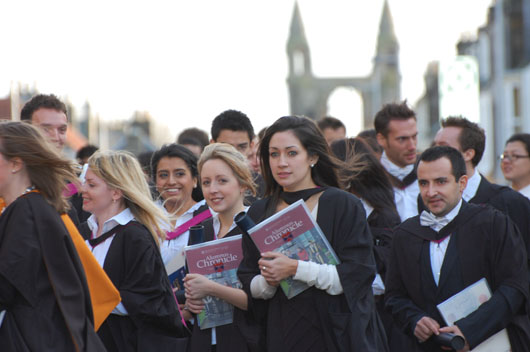Graduation address – Dr Anthony Lang

30 November 2011, 3.30pm
Vice Chancellor, Fellow faculty members, university colleagues, family, friends, and, most importantly, graduates:
Congratulations! You have done it. Not only have you made it through your course of studies and received a well-earned degree; you have also made it through this ceremony and are undoubtedly looking forward to a well-earned pint or other libation with friends and family. And, indeed, you deserve it. St Andrews does not grant degrees lightly. At times, I am guessing, this day may have seemed very far away. It may have seemed impossible. But, you made it.
I have only a few minutes to tell you something interesting, so I am going to tell you a story about a famous lecture here at St Andrews. I know, you have heard many lectures during your time here. But I hope this one will be instructive in some small way.
On 9 March 1939, a professor from Oxford University came to the University of St Andrews to deliver the Andrew Lang lecture. The lecture series was in honour of the great Scottish folklorist, Andrew Lang (no relation to me, I’m afraid) who had collected a wide range of fairy tales in a series of coloured volumes that captured the European and British fairy tale tradition. The lecturer chose a topic that would have been of great interest to Lang. He entitled it “On Fairy Stories”.
The lecturer argued that the distinguishing feature of a fairy story is that it has a happy ending. But, crucially, the ending of fairy stories does not come about easily. No, a fairy story is defined by the fact that there is a dreadful set of circumstances that must be overcome at the last minute. The lecturer coined a neologism to describe this fact – a “eucatastrophe”. Combining the Greek prefix “eu” which means good with the word catastrophe, or abrupt change, the lecturer suggested that in a fairy story the happy ending only comes about because of an earlier decision that may not have seemed the right one at the time.
The person who gave that lecture went on to write one of the most famous fairy stories of the 20th century. JRR Tolkien delivered this lecture between the time that he wrote The Hobbit and the Lord of the Rings. For those of you who know these stories, you might remember the eucatastrophe that Tolkien put into his own fairy tale: Bilbo Baggins decides not to kill the creature Gollum, a decision that means Gollum helps to destroy the One Ring and hence save Middle Earth.
I realize you are finished with lectures, but let me make one link with my own field of international relations. In the area of the world that I know best, the Middle East, there are rarely eucatastrophes. Happy endings are not the stuff of politics. Yet one catastrophe – a young man setting himself on fire in Tunisia in December 2010 in protest against unjust treatment by the authorities – led to the collapse of oppressive governments throughout the region. It is not clear if the eucatastrophe that is the Arab Spring is over or will ever be over. And yet, perhaps we can see here how what seems a tragedy at one point can become a powerful force for justice in a world filled with oppression.
Let me conclude with two thoughts that are closer to home. First, we did have one happy ending take place in April of this year when two students from St Andrews were married in a rather public ceremony. Now I don’t know all the details of the relationship of Prince William and the Duchess of Cambridge, and I’m not sure I want to know how many catastrophes they experienced here at St Andrews or after they left. But, we did have a glimpse of a fairy tale in their rather glorious wedding day, one we celebrated here at St Andrews.
Second, perhaps the idea of a eucatastrophe can help shed some light on your experience. Your happy ending, the fact that you walked onto this stage and received a degree may well have resulted from a decision that at the time seemed catastrophic. Indeed, your parents and families may have thought that their decision to spend so much money on your education was the very definition of a catastrophe! And undoubtedly, you also had your own moments of catastrophe – the decision to take a module from that difficult lecturer, a choice of a dissertation subject that seemed interesting at the time but became a nightmare to write, or your struggles with a library renovation process that seemed endless. For both you and your families, I hope that these seeming catastrophes were really part of the story that led to your own eucatastrophe, the happy ending of receiving a degree from one of the finest universities in the world.
When Tolkien eventually published his lecture, he suggested that no eucatastrophe is really an ending. Rather, it is a beginning, the launching of something new and better than before. The fairy tale itself must end, but the eucatastrophe creates something new. In the Arab world, there are new political orders arising. For the young royal couple, perhaps a new beginning will appear in the not too distant future. And for you, this graduation begins, I hope, a new life, one that is enriched and inspired by your time here at St Andrews. Good luck and congratulations!
Category University news